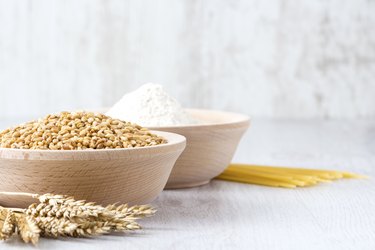
Gluten is a protein found in many types of grains, including wheat, barley, rye and triticale. Proteins are common triggers of food allergies, and gluten falls to this category. People who produce Immunoglobulin E antibodies against gluten develop an allergy, which is associated with many symptoms, including a cough. If you suspect you have a food allergy, consult your doctor. In some cases, a food allergy can cause a life-threatening anaphylactic shock.
Wheat Allergy
Video of the Day
Wheat allergy is caused by an antibody response against one or more of the proteins found in wheat, including gluten, albumin, gliadin and globulin. When you eat wheat, your body triggers an immune response against the proteins, which leads to the release of histamine. Besides eating wheat, you may also get an allergy when you inhale it. Baker's asthma is another gluten or wheat allergy that is caused by inhaling wheat flour rather than eating it. Wheat allergy causes mild to severe reactions in your body such as wheezing, skin rash, abdominal pain, breathing difficulties, swelling of the mouth, diarrhea and vomiting.
Video of the Day
Celiac Disease
Celiac disease is a gluten-sensitivity disorder rather than an allergy. However, consuming even the smallest amount of gluten can cause abdominal pain and damage to the digestive system. Your small intestine is lined with small projections called villi, which absorb the nutrients from food into your body, according to the National Digestive Diseases Information Clearinghouse. If you have celiac disease, the consumption of gluten can damage and destroy the villi, resulting in poor or incomplete absorption of nutrients. Over time this leads to severe malnutrition and delayed growth and development. While the disease is thought to run in families, no clear cause has been determined.
Cough
Although cough is a rare symptom, it can occur if you are allergic or sensitive to gluten. Cough can be associated with baker's asthma and wheat allergy, according to Dr. Stephen Wangen, a licensed physician who specializes in digestive disorders and food allergies. If you have chronic obstructive pulmonary disease, it can further increase your risk of cough associated with wheat allergy. Celiac disease can also be associated with chronic cough and airway inflammation, and removing gluten from the diet can ease the symptoms, according to a study published in the "Thorax" journal in 2002.
Treatment
Treatment for both wheat allergy and celiac disease includes removing all sources of gluten from your diet, including rye, barley, wheat and wheat varieties such as bulgur, durum, farro, graham flour, semolina, and spelt. Wheat is a common ingredient in pasta, breads, cereal and baked goods, but it also can be found in condiments, soy sauce, couscous, hot dogs, ice cream, candy and foods with natural flavorings and modified food starch. Read all nutrient labels prior to buying foods and avoid foods that aren't clearly labeled as gluten-free. When cooking or baking, try substituting gluten-free flour for all-purpose flour in recipes. Other gluten-free cooking substitutes include corn, cornmeal, buckwheat, quinoa, rice, tapioca and potatoes.
Is this an emergency? If you are experiencing serious medical symptoms, please see the National Library of Medicine’s list of signs you need emergency medical attention or call 911.